Module3 Unit 1 Has it arrived yet?重难点课件(共14张PPT)
文档属性
| 名称 | Module3 Unit 1 Has it arrived yet?重难点课件(共14张PPT) |

|
|
| 格式 | ppt | ||
| 文件大小 | 1.7MB | ||
| 资源类型 | 教案 | ||
| 版本资源 | 外研版 | ||
| 科目 | 英语 | ||
| 更新时间 | 2022-06-13 00:00:00 | ||
图片预览

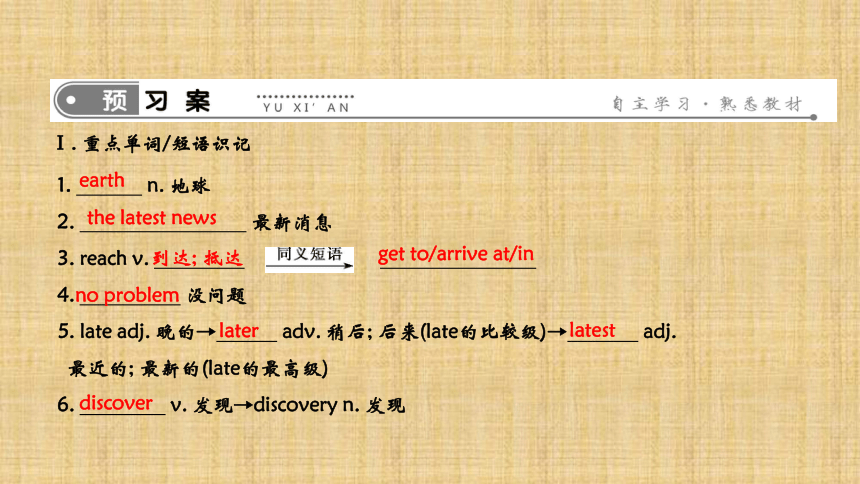
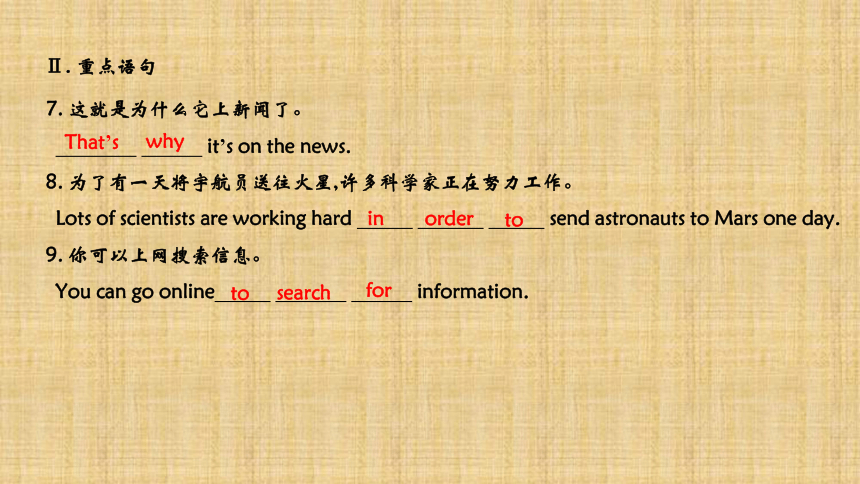
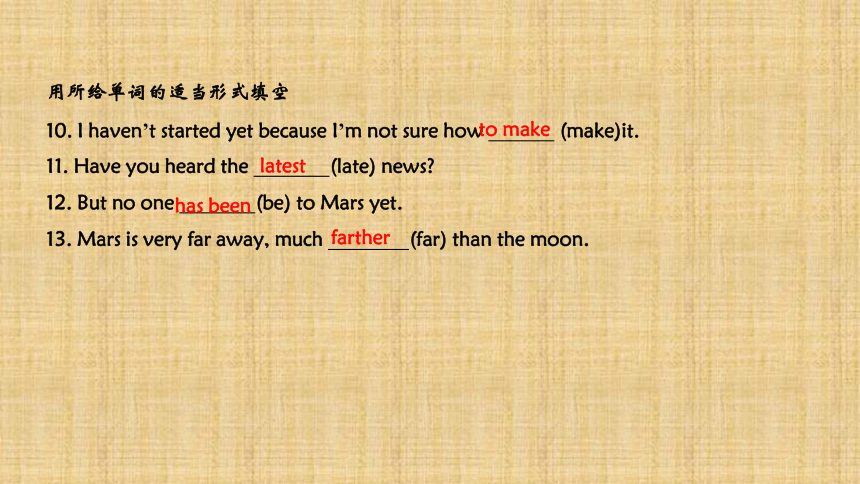
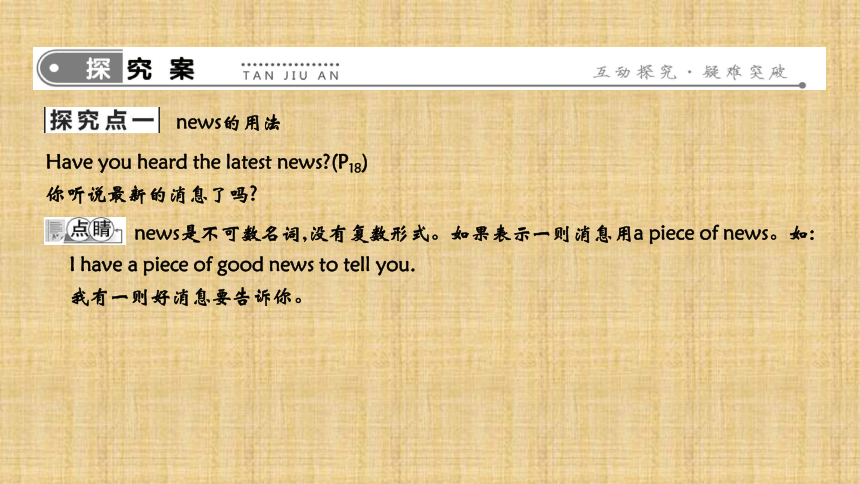
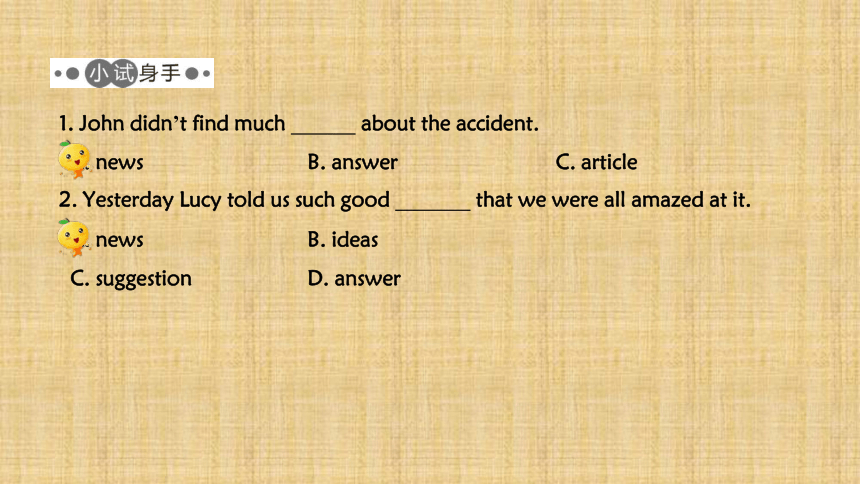
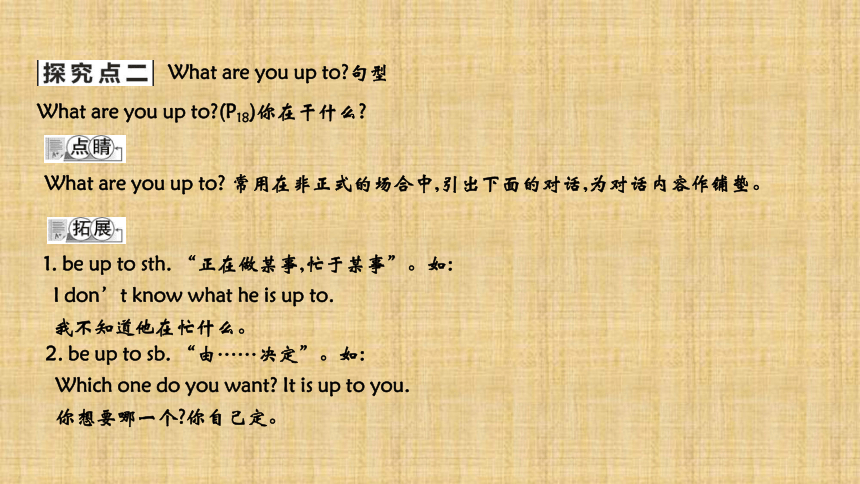
文档简介
(共14张PPT)
Module 3 Journey to space
Unit 1 Has it arrived yet
重难点课件
Ⅰ. 重点单词/短语识记
1. n. 地球
2. 最新消息
3. reach v.
4. 没问题
5. late adj. 晚的→ adv. 稍后; 后来(late的比较级)→ adj.
最近的; 最新的(late的最高级)
6. v. 发现→discovery n. 发现
earth
the latest news
到达; 抵达
get to/arrive at/in
no problem
later
latest
discover
7. 这就是为什么它上新闻了。
it’s on the news.
8. 为了有一天将宇航员送往火星,许多科学家正在努力工作。
Lots of scientists are working hard send astronauts to Mars one day.
9. 你可以上网搜索信息。
You can go online information.
Ⅱ. 重点语句
That’s
why
in
order
to
to
search
for
10. I haven’t started yet because I’m not sure how (make)it.
11. Have you heard the (late) news
12. But no one (be) to Mars yet.
13. Mars is very far away, much (far) than the moon.
用所给单词的适当形式填空
to make
latest
has been
farther
news的用法
Have you heard the latest news (P18)
你听说最新的消息了吗
news是不可数名词,没有复数形式。如果表示一则消息用a piece of news。如:
I have a piece of good news to tell you.
我有一则好消息要告诉你。
1. John didn’t find much about the accident.
A. news B. answer C. article
2. Yesterday Lucy told us such good that we were all amazed at it.
A. news B. ideas
C. suggestion D. answer
What are you up to 句型
What are you up to (P18)你在干什么
What are you up to 常用在非正式的场合中,引出下面的对话,为对话内容作铺垫。
1. be up to sth. “正在做某事,忙于某事”。如:
I don’t know what he is up to.
我不知道他在忙什么。
2. be up to sb. “由……决定”。如:
Which one do you want It is up to you.
你想要哪一个 你自己定。
1. —
—I’m writing a novel.
A. What do you want B. How do you do
C. How are you D. What are you up to
2. —Our neighborhood is so dirty. Shall we clean it this afternoon or
tomorrow
— . Any time is OK. (2018南充)
A. It is up to you
B. Excuse me
C. Have a good time
D. I’m afraid I can’t
yet的用法
I haven’t started yet because I’m not sure how to make it. (P18)
我还没有开始做呢,因为我不确定怎么做。
yet为副词,意为“还,尚”,常用于否定句或疑问句的句尾。
辨析:yet与already
yet 常用在否定句(还,尚)和疑问句中(已经)。not. . . yet意为“还没,尚未”,表示某事物在某一时间尚未发生,但未来也许会发生。如:
We haven’t learnt any further information yet. 我们还没有得到进一步的消息。
already 常用在肯定句中,意为“已经”。有时也可以用在疑问句中,暗示说话人的“惊奇; 意外”。如:
I have already seen the film.
我已经看过那部电影了。
Have you already had breakfast
难道你吃过早饭了
1. —Have you eaten
—Not .
A. yet; already B. already; yet
C. yet; yet D. already; already
2. We have seen the film .
A. already B. ever
C. yet D. just
3. I have already finished reading the book. (改为否定句)
I reading the book .
haven’t
finished
yet
discover v. 发现; 找到
So have they discovered life on Mars (P18)
所以他们在火星上发现生命了吗
discover动词,意为“发现; 找到”,强调发现客观存在但不为人知的事物,后接名词作宾语。如:
Columbus discovered America in 1492.
哥伦布于1492年发现了美洲大陆。
辨析:look for, find与find out
find out 查明; 弄清楚 强调经过一番努力或询问而查明某事或真相
look for 寻找 强调寻找的过程和动作
find 找到 强调寻找的结果
选词填空(look for/find/discover/find out)
1. The policemen wanted to who stole the gold.
2. Tom a box of gold on the island with his friends.
3. My pet dog was lost. I it everywhere and I it in the garden.
find out
discovered
looked for
found
Module 3 Journey to space
Unit 1 Has it arrived yet
重难点课件
Ⅰ. 重点单词/短语识记
1. n. 地球
2. 最新消息
3. reach v.
4. 没问题
5. late adj. 晚的→ adv. 稍后; 后来(late的比较级)→ adj.
最近的; 最新的(late的最高级)
6. v. 发现→discovery n. 发现
earth
the latest news
到达; 抵达
get to/arrive at/in
no problem
later
latest
discover
7. 这就是为什么它上新闻了。
it’s on the news.
8. 为了有一天将宇航员送往火星,许多科学家正在努力工作。
Lots of scientists are working hard send astronauts to Mars one day.
9. 你可以上网搜索信息。
You can go online information.
Ⅱ. 重点语句
That’s
why
in
order
to
to
search
for
10. I haven’t started yet because I’m not sure how (make)it.
11. Have you heard the (late) news
12. But no one (be) to Mars yet.
13. Mars is very far away, much (far) than the moon.
用所给单词的适当形式填空
to make
latest
has been
farther
news的用法
Have you heard the latest news (P18)
你听说最新的消息了吗
news是不可数名词,没有复数形式。如果表示一则消息用a piece of news。如:
I have a piece of good news to tell you.
我有一则好消息要告诉你。
1. John didn’t find much about the accident.
A. news B. answer C. article
2. Yesterday Lucy told us such good that we were all amazed at it.
A. news B. ideas
C. suggestion D. answer
What are you up to 句型
What are you up to (P18)你在干什么
What are you up to 常用在非正式的场合中,引出下面的对话,为对话内容作铺垫。
1. be up to sth. “正在做某事,忙于某事”。如:
I don’t know what he is up to.
我不知道他在忙什么。
2. be up to sb. “由……决定”。如:
Which one do you want It is up to you.
你想要哪一个 你自己定。
1. —
—I’m writing a novel.
A. What do you want B. How do you do
C. How are you D. What are you up to
2. —Our neighborhood is so dirty. Shall we clean it this afternoon or
tomorrow
— . Any time is OK. (2018南充)
A. It is up to you
B. Excuse me
C. Have a good time
D. I’m afraid I can’t
yet的用法
I haven’t started yet because I’m not sure how to make it. (P18)
我还没有开始做呢,因为我不确定怎么做。
yet为副词,意为“还,尚”,常用于否定句或疑问句的句尾。
辨析:yet与already
yet 常用在否定句(还,尚)和疑问句中(已经)。not. . . yet意为“还没,尚未”,表示某事物在某一时间尚未发生,但未来也许会发生。如:
We haven’t learnt any further information yet. 我们还没有得到进一步的消息。
already 常用在肯定句中,意为“已经”。有时也可以用在疑问句中,暗示说话人的“惊奇; 意外”。如:
I have already seen the film.
我已经看过那部电影了。
Have you already had breakfast
难道你吃过早饭了
1. —Have you eaten
—Not .
A. yet; already B. already; yet
C. yet; yet D. already; already
2. We have seen the film .
A. already B. ever
C. yet D. just
3. I have already finished reading the book. (改为否定句)
I reading the book .
haven’t
finished
yet
discover v. 发现; 找到
So have they discovered life on Mars (P18)
所以他们在火星上发现生命了吗
discover动词,意为“发现; 找到”,强调发现客观存在但不为人知的事物,后接名词作宾语。如:
Columbus discovered America in 1492.
哥伦布于1492年发现了美洲大陆。
辨析:look for, find与find out
find out 查明; 弄清楚 强调经过一番努力或询问而查明某事或真相
look for 寻找 强调寻找的过程和动作
find 找到 强调寻找的结果
选词填空(look for/find/discover/find out)
1. The policemen wanted to who stole the gold.
2. Tom a box of gold on the island with his friends.
3. My pet dog was lost. I it everywhere and I it in the garden.
find out
discovered
looked for
found
同课章节目录
- Module 1 Feelings and impressions
- Unit 1 It smells delicious.
- Unit 2 I feel nervous when I speak Chinese .
- Unit 3 Language in use
- Module 2 Experiences
- Unit 1 I've also entered lots of speaking competi
- Unit 2 They have seen the Pyramids.
- Unit 3 Language in use
- Module 3 Journey to space
- Unit 1 Has it arrived yet?
- Unit 2 We have not found life on any other planet
- Unit 3 Language in use
- Module 4 Seeing the docto
- Unit 1 I haven't done much exercise since I got m
- Unit 2 We have played football for a year now
- Unit 3 Language in use
- Module 5 Cartoons
- Unit 1 It's time to watch a cartoon.
- Unit 2 Tintin has been popular for over eighty yea
- Unit 3 Language in use
- Revision module A
- Module 6 Hobbies
- Unit 1 Do you collect anything ?
- Unit 2 Hobbies can make you grow as a person.
- Unit 3 Language in use
- Module 7 Summer in Los Angeles
- Unit 1 Please write to me and send me some photos
- Unit 2 Fill out a form and come to learn English
- Unit 3 Language in use
- Module 8 Time off
- Unit 1 I can hardly believe we are in the city ce
- Unit 2 We thought somebody was moving about
- Unit 3 Language in use
- Module 9 Friendship
- Unit 1 Could I ask if you've mentioned this to he
- Unit 2 I believe that the world is what you think
- Unit 3 Language in use
- Module 10 On the radio
- Unit 1 I hope that you can join us one day
- Unit 2 It seemed that they were speaking to me in
- Unit 3 Language in use
- Revision module B
